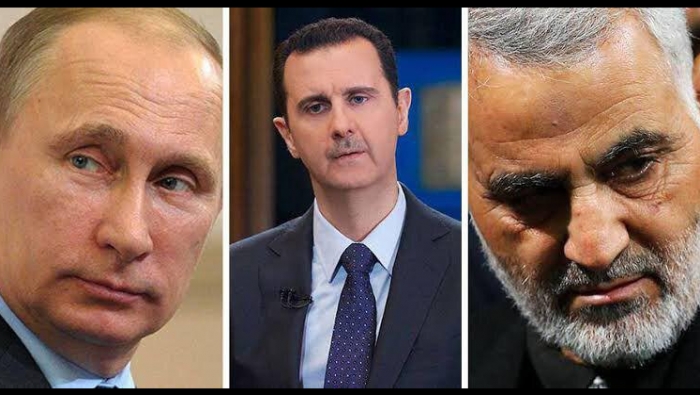Russia is continuing to deliver blows one after the other to Tehran in Syria. From the Israeli-Russian coordination to bombard Iranian sites in Syria, to keeping them out of the Sochi agreement signed between Ankara and Moscow around Idleb, and then restricting their role in the regime forces by giving orders to the regime head to keep out a number of officers close to Tehran and dismiss them. Will the Jerusalem meeting between America, Russia and Israel be the strongest blow delivered to Tehran by its theoretical ally in Syria?
The Iranians accuse Moscow of providing information to the Israelis about their movements and positions in Syria with the aim of bombing them, as well as informing the Israelis of Iran and Hezbollah’s coming movements, with their movements paralyzed after airstrikes more than once, along with Russia’s continuous efforts to neutralize the Iranian presence in southern Syria and hit Iranian commanders with organized assassinations.
Russian media has revealed reports that the United States and Israel intend to offer a political deal to the Assad regime whereby American sanctions are lifted in exchange for Iran’s military withdrawal during the Israeli-Russian-American meeting in Jerusalem.
The sources said that US and Israeli representatives will propose during their meetings with the Russian Security Council Secretary a bargain to “limit Iranian influence” in Syria in exchange for lifting US sanctions that have been imposed on the Assad government, and recognizing the “legitimacy” of the regime head, Bashar al-Assad.
The Jerusalem meeting is considered to be the foundation of a new stage in the course of the conflict in Syria and the region, which has been a source of polarization and competition between international and regional actors. This has appeared to crystallize in the current competition between Iran and Russia to monopolize areas of influence in Syria, security force centers, and various militias. Iran has become the dominant regional power in Syria because of its deep experience and relationships as well as its ability to exploit contradictions among the parties to the conflict, and to penetrate and manipulate them in a way that serves its agenda. But Iran is different from Turkey, which fell into the trap of the Astana track and the Sochi agreement. This has been manifested on a practical level in the strategy of the de-escalation zones, which Russia has gradually devoured, with nothing left except Idleb province and the liberated areas around it where Turkey is clinging to the last area under its influence.
Moscow needs cooperation from the Assad regime if the Jerusalem conference succeeds. This would begin with an official request from Assad for the Iranians to withdraw in order to obtain the first part of the deal to “end the regime’s international isolation”—a flexible term that could include mitigating fuel and other basic goods rationing under which regime-controlled areas are suffering and to provide a specific amount of “normalization” in line with the regime’s response and cooperation.
However this request is impossible. Assad has put himself at Khamenei’s disposal because he knows that he is unable to get Iranian shackles off his regime’s entities. Iranian militias are deployed throughout its apparatus, and on all the fronts. On the outskirts of his palace stands Qasem Soleimani, representative of the Quds Force, led by Tehran, in anticipation of Netanyahu’s visit to Moscow. After a long period of bloody rule in which he tried to find alliances and balances and political agreements, Assad has found himself prey before the Iranian snake, who will not hesitate to issue a fatwa calling him an infidel or accuse him of betraying the “Axis of Resistance” and maybe eliminating him, if needed, because he is a burnt card which no one bets upon except to use him to give legitimacy to occupiers.
This article was translated and edited by The Syrian Observer. Responsibility for the information and views set out in this article lies entirely with the author.


